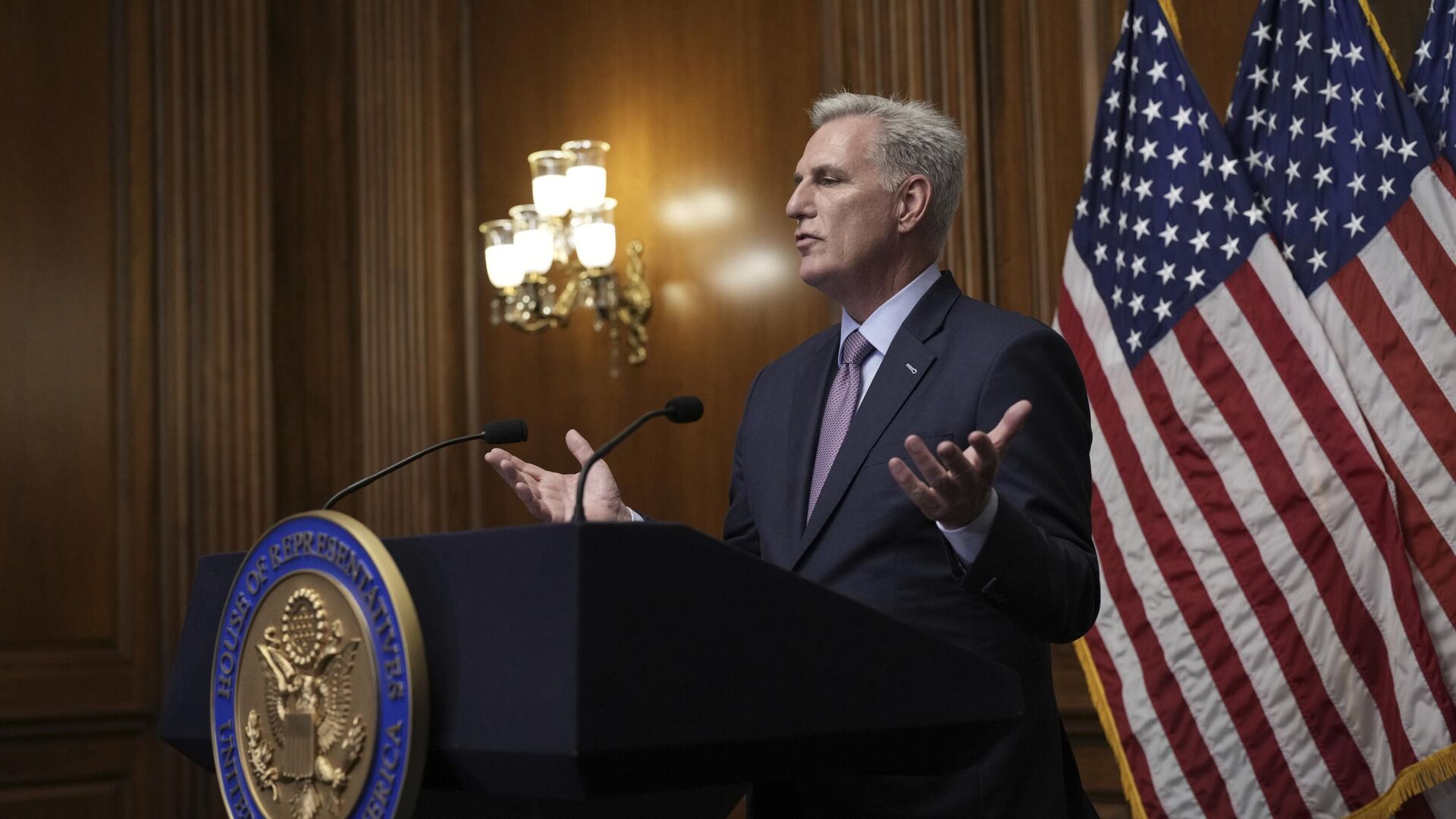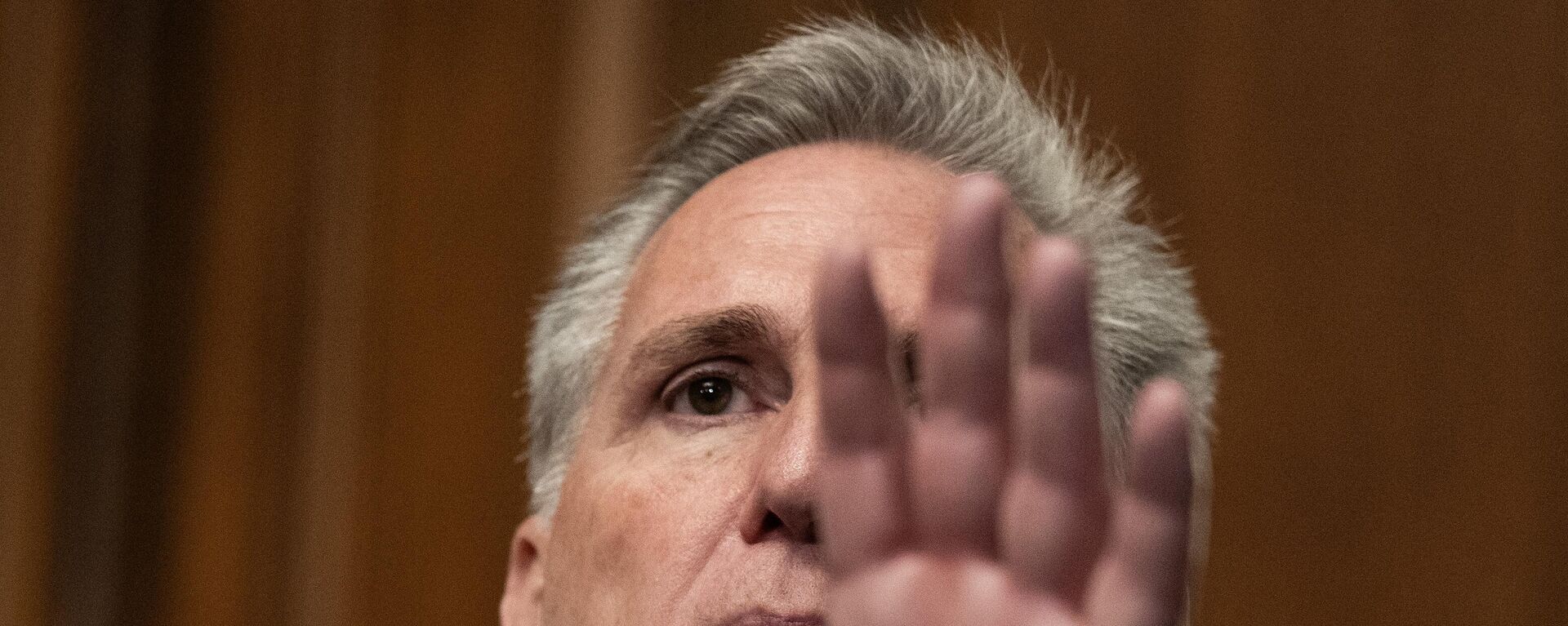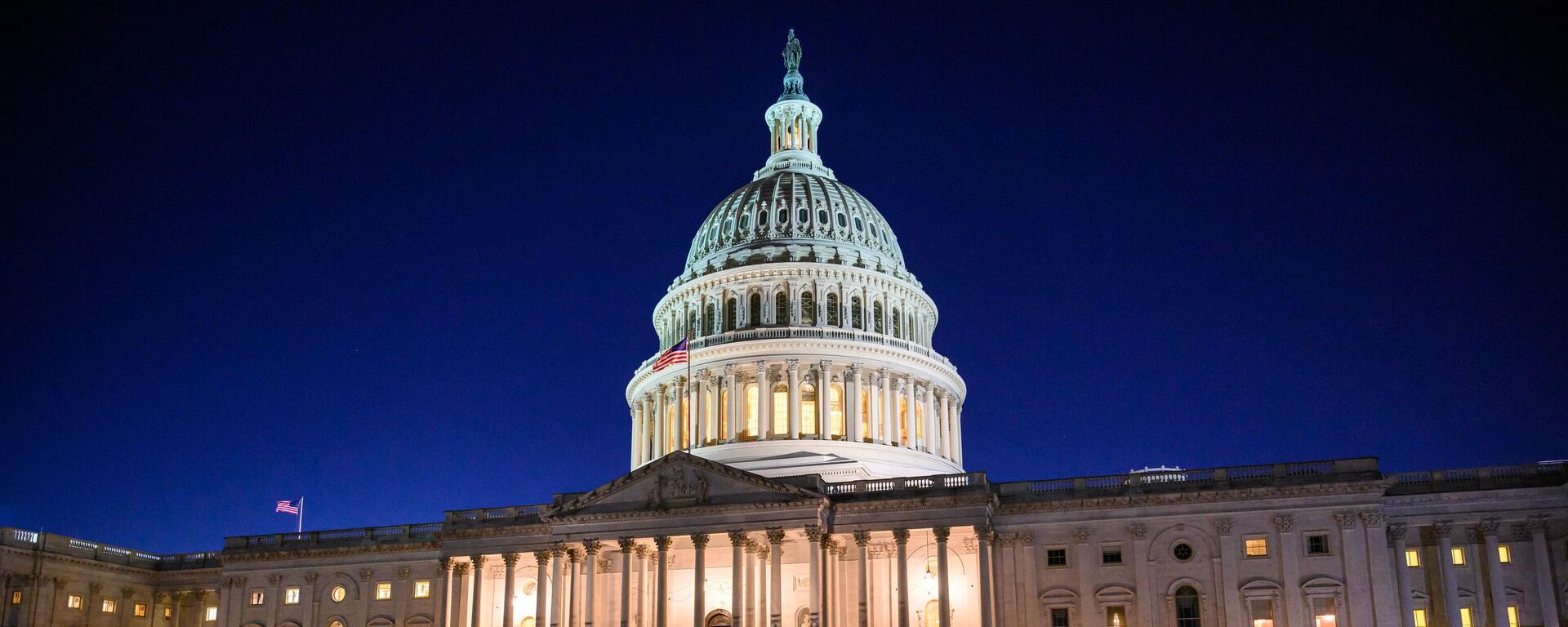Total Mess: Why was US House Speaker McCarthy Ousted?
18:58 04.10.2023 (Updated: 12:25 10.10.2023)

© AP Photo / J. Scott Applewhite
Subscribe
The US House of Representatives on Tuesday ousted Kevin McCarthy as Speaker of the House.
The initiative to remove McCarthy as House speaker originated in the GOP Freedom Caucus and personally with Florida Rep. Matt Gaetz. It was Gaetz who kicked off the "motion to vacate." As a result, all Democratic representatives voted to oust McCarthy, being joined by seven Republicans. North Carolina GOP Rep. Patrick McHenry has taken the reins of the chamber as "speaker pro tempore."
"The overthrow of Kevin McCarthy as Speaker of the House is unprecedented and reflects the close competition between the Republicans and Democrats for majority status as well as a rift in governing style within the GOP," Dr. Harvey Schantz, professor of political science at the State University of New York at Plattsburgh, told Sputnik.
"The Republican Party is a conservative party which looks to limit the levels of government spending. Majority status in the House, however, means that it is sometimes necessary to compromise beliefs in order to reach a compromise with the Democrats to fund the government. The eight members of the Republican Conference who voted against continuing McCarthy as speaker were more interested in their economic beliefs than they were in seeing the government proceed smoothly," the professor continued.
Why Eight Angry Republicans Removed House Speaker
On September 28, the Freedom Caucus sent McCarthy a letter with regard to appropriation bills in the run-up to the expiration of government funding. In this letter, Republican members of Congress reminded McCarthy about his earlier promise to consider appropriations bills separately and not wrap them into one continuing resolution (CR); expressed concerns about the continuous Ukraine funding; and urged the speaker to implement spending reductions which were earlier agreed on by the Republicans.
Nonetheless, on September 30, McCarthy brought to the floor the CR version of a stopgap measure that did not include spending cuts or policy changes, except for throwing out a $6 billion Ukraine package. The bill was swiftly approved by the Senate. "If somebody wants to make a motion against me, bring it," McCarthy told the US press afterwards. "There has to be an adult in the room. I am going to govern with what’s best for this country."
In response, eight Republicans from the Freedom Caucus took up the challenge and removed him.
"Well, in McCarthy[‘s case] in particular, it says you shouldn't make promises that you either a) don't intend to keep or b) [are] too weak to keep. I don't think he ever intended to keep those promises. And he didn't figure that the conservatives, the MAGA folks in the House would actually call his bluff. But they did. And so now he is the shortest speaker in the history of the United States," Michael Shannon, a political commentator and Newsmax columnist, told Sputnik.
"There are committed conservatives, you can call them MAGA, who actually believe what they tell their voters. And more important, they don't hold their voters in contempt. And so they try to do what they promised. And they see that these Continuing Resolutions [...] are just continuing the decline, which actually is increasing in speed. [...] So they're willing to try something new and that's what they did," Shannon continued.
According to observers, McCarthy's decision to kick off an impeachment inquiry against Joe Biden prompted the Dems to grab the opportunity to vote him out.
"Note that it was the Democrats' vote that contributed equally to this, which reflects the extreme partisan conflict in American politics," Robert Shapiro, a Columbia University professor specializing in US politics, told Sputnik.
Why is Speaker's Removal Triggering Criticism?
The unprecedented removal of the speaker triggered criticism on both sides of the US political aisle. Both GOP and Dem observers are concerned that McCarthy's removal came amid the funding debate. Moreover, the threat of government shutdown was only postponed, not averted: the US Congress has just one month to come up with a solution that would satisfy both parties. Still, now they have another political fight ahead: to choose a new speaker.
Having agreed that Kevin McCarthy let his party fellows down, prominent legal scholar Jonathan Turley noted in his blog: "What I do not get is how vacating the chair will change anything." Per him, it looks like the eight hardliners from the Freedom Caucus don't have a plan for what to do next.
For his part, former President Donald Trump posted on Truth Social asking why "Republicans are always fighting among themselves?"
After the gavel was passed to McHenry, the newly appointed speaker pro tempore sent lawmakers home for the remainder of the week despite Rep. Gaetz objecting and calling for electing a new speaker as soon as possible. It seems like the chaos could persist for some time, until a new speaker is chosen.
"I wouldn't say it's total, but it's certainly a mess," Timothy Hagle, a political science professor at the University of Iowa, told Sputnik. "Democrats do a better job of keeping their members in line. With such a slim majority in the House, there is always the possibility that a few members can cause problems. That could be in terms of stopping legislation or something like this with the Speaker. Of course, this type of situation makes it easy for Democrats and others to use disagreements among Republicans to their advantage."
Despite the seriousness of the contradictions within the Republican Party, they can be overcome, according to Hagle.
"Funding for Ukraine and spending in general are two things that are currently dividing Republicans," he said. "As to the latter, there are Republicans in Congress that were elected by running on the idea that government spending is out of control and needs to be reduced. It turns out that in the past, many Congressmembers who claimed to want to cut spending end up voting for more spending. Some members have had enough and wanted to resist the brinkmanship of waiting until a government shutdown is near and then agreeing to new spending."
Who Could Become New House Speaker?
"Pundits list Steven Scalise or Jim Jordan as potential successors, but each has strong weaknesses, especially Jordan," John Tures, political science professor at LaGrange College in Georgia, told Sputnik. "Scalise could surprise me as he's too conservative for the country, but might keep Republicans more in-line with better tactics. Either of the Toms: Tom Emmer or Tom Cole would be the best. Look for Elise Stefanik to get a lot of consideration for a GOP willing to try something new."
Meanwhile, some Republicans signaled they wanted to nominate former President Donald Trump as a new House speaker. Reps Troy Nehls, Marjorie Taylor Greene, and Greg Steube said they would back the former president. Fox News host Sean Hannity told his viewers on Tuesday that some GOP members had reached out to Trump, claiming that the latter "might be open to helping the Republican Party."
"Although it is true that a speaker does not have to be a duly elected member of the House, it is unlikely that we will see a Speaker Trump in the near future, for the former president does not want to get bogged down in the responsibilities and politics of the House of Representatives, preferring to run for another term in the White House and protect his legal interests," Schantz noted.
"I am not sure about this. They could even choose Trump, but Trump has a full plate at the moment!" echoed Shapiro, referring to the former president's numerous litigations.
What Does Removal of House Speaker Say About State of US Democracy?
American democracy has obviously not found itself in a good place, per Tures. It's equally bad for both of the two major parties.
"Liberal friends of mine are equally concerned about what this says," he said. "This is no time for Democrats to rejoice as well. It's time for both parties to get back in touch with the American people, answer the propaganda they've ignored, and put forth a plan that goes beyond November, and reflects a vision of where we should go over the next 10 years. Both sides need to do that."
For his part, Schantz blames "the great ideological divides between the two political parties and the stylistic differences among the members in each of the parties."
Hagle believes that despite the partisanship and ideological divide, the episode with McCarthy's ouster "also highlights the value of democracy in that people have the ability to disagree with each other and select the leaders they prefer."
Meanwhile, controversies are continuing to pile up, and they go well beyond the partisan and internal GOP struggle in the US Congress: a looming recession still threatens the US economy; and polls show that the American people are weary of the Biden administration's overseas adventures, including its proxy war in Ukraine, and want the White House to solve urgent domestic problems. Apparently, the question is what party or faction is willing to address those problems and reshuffle the established political agenda.


